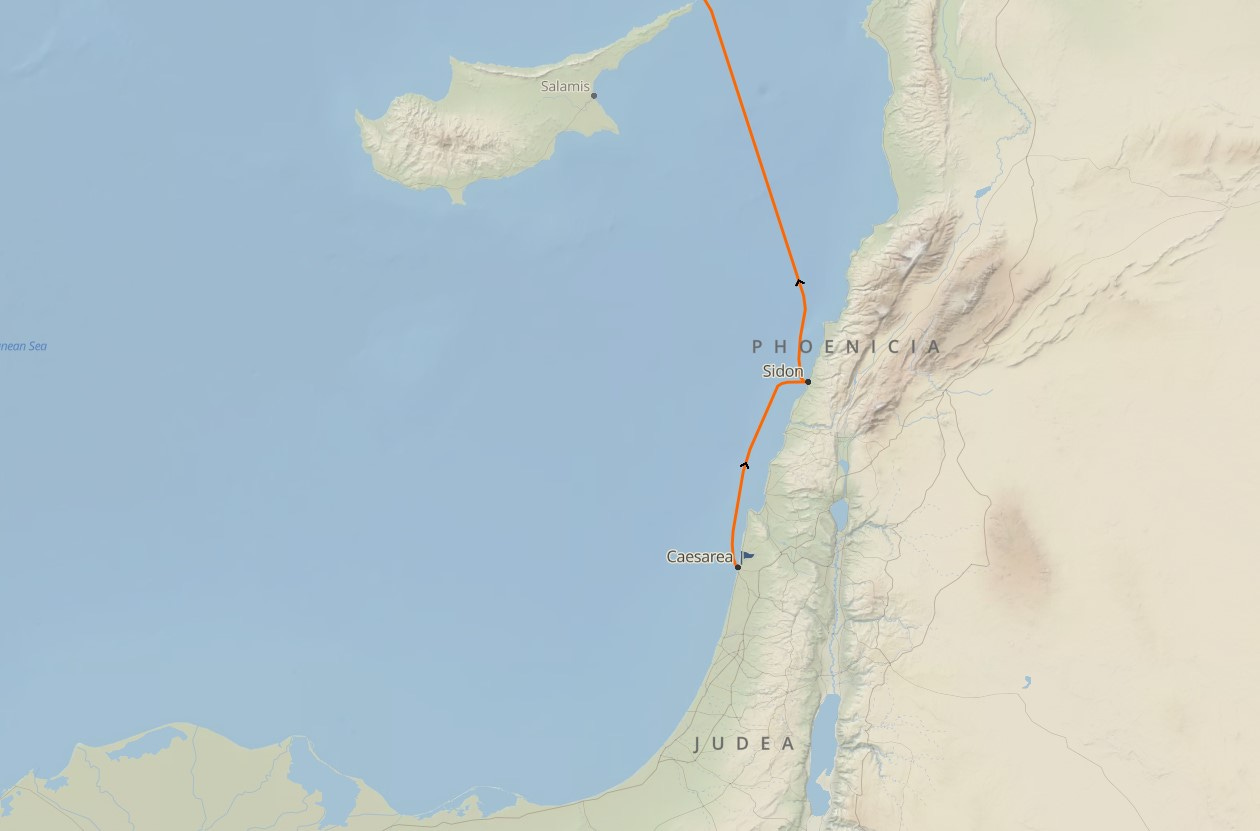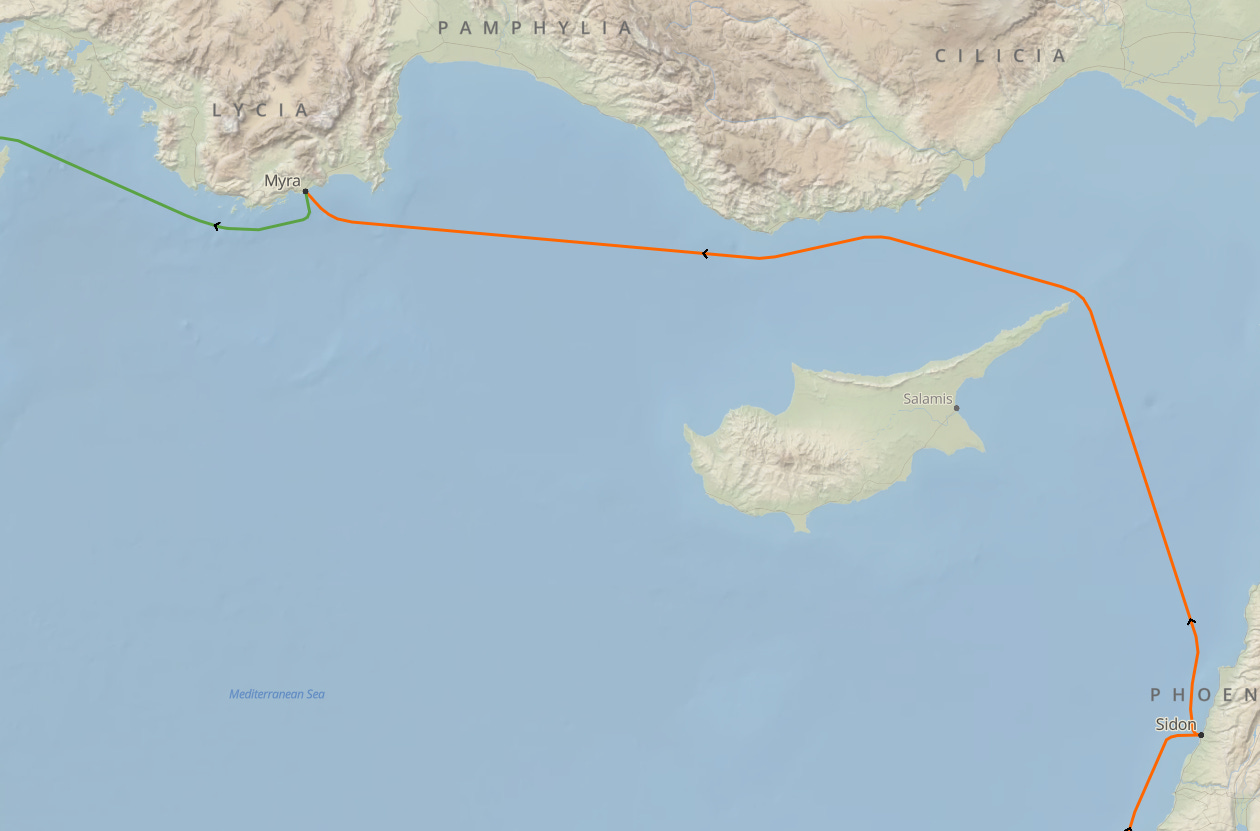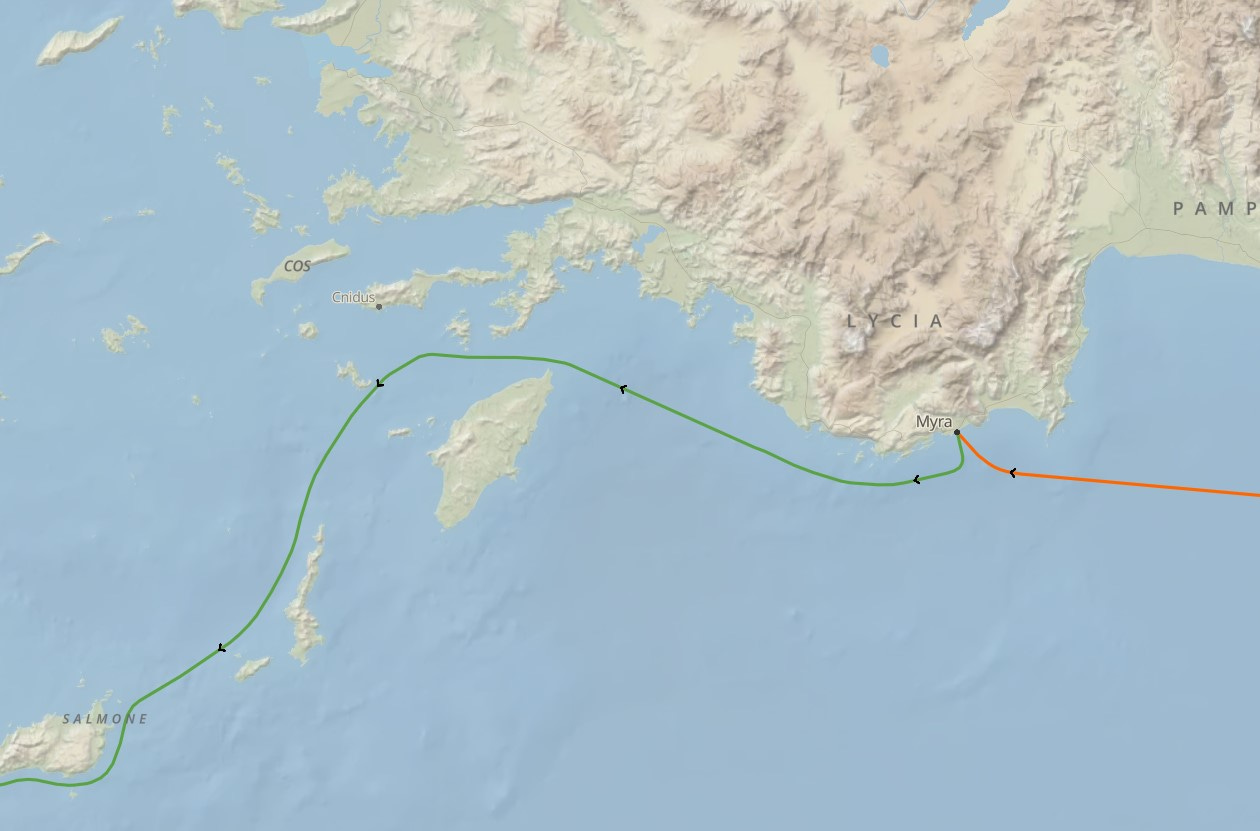A Study of Acts: The Voyage to Rome Begins
Acts 27:1-8 - Even the voyages described in Acts can bring a person to faith. Thank the Lord for Luke’s attention to detail.

“When it was decided that we would sail for Italy, they proceeded to deliver Paul and some other prisoners to a centurion of the Augustan cohort named Julius. And embarking in an Adramyttian ship, which was about to sail to the regions along the coast of Asia, we put out to sea accompanied by Aristarchus, a Macedonian of Thessalonica. The next day we put in at Sidon; and Julius treated Paul with consideration and allowed him to go to his friends and receive care. From there we put out to sea and sailed under the shelter of Cyprus because the winds were contrary. When we had sailed through the sea along the coast of Cilicia and Pamphylia, we landed at Myra in Lycia. There the centurion found an Alexandrian ship sailing for Italy, and he put us aboard it. When we had sailed slowly for a good many days, and with difficulty had arrived off Cnidus, since the wind did not permit us to go farther, we sailed under the shelter of Crete, off Salmone; and with difficulty sailing past it we came to a place called Fair Havens, near which was the city of Lasea.”
Acts 27:1-8 NASB1995
Note as we enter the second-to-last chapter of Acts that the writing tense has changed again to the first person plural. Luke is back with the group, although there is nothing found that says that he wasn’t there during the hearings that Paul had with Festus and Agrippa. Timeline analyses of Paul’s life indicate that this departure was probably in October of A.D. 59 or 60 Paul and other prisoners were delivered to a centurion of the Augustan cohort named Julius. A Centurion is a company commander, selected as a leader over 100 troops. Julius is described as being kind to Paul, allowing companions on board (Luke and Aristarchus, a Jewish disciple that Paul met in Macedonia, for example) and giving him time to see friends and receive care. Some commentators speculate that Julius was present at the hearing before King Agrippa in Acts 26.
The group first embarks on an Adramyttian ship, which would be from the Roman province of Asia. They are able to make the distance from Caesarea to Sidon in one day (about 70 miles), obviously encountering favorable winds. The details in Acts 27, about this voyage, and in Acts 28 served to convert a skeptic, as noted in this commentary by the late H.A. Ironside, a Canadian Bible Scholar and pastor at the Moody College, as quoted in Precept Austin:
Acts 27 is one of the chapters of the Bible that we really ought to study with a map of the Mediterranean before us. Those who have carefully investigated Luke’s record are amazed at the accuracy with which he refers to the various ports and to ancient shipping routes. Some people have suggested that perhaps certain portions of the Bible were written at a date later than they professed to be. The book of Acts has been particularly attacked. Some years ago a little group of freethinkers in Scotland decided on a plan whereby they might show up the supposed inaccuracies of Scripture, and so discredit the Word of God. One member was given the task of going to Asia Minor, southern Europe, and the islands of the Mediterranean, visiting all the places mentioned by Luke in connection with Paul’s journeys. It was hoped that he would be able to unearth enough information to make evident any falsity in Luke’s record, so that many who had pinned their faith to the book of Acts as a part of God’s inspired Word would have to give it up. The young man chosen was Sir William Mitchell Ramsay. He investigated very carefully, and after the most minute examination concluded that Luke was absolutely accurate in every particular. He himself, once a freethinker, became a Christian and wrote some splendid books in defense of the Word of God. (Acts 27 Commentary).
When they arrive in Sidon, Julius treated Paul with consideration and allowed him to go see his friends and receive care. As the centurion in charge of Paul and other prisoners, this already shows the extraordinary trust that Julius had in Paul, because he could be imprisoned or worse for allowing a prisoner to leave his sight. Paul’s care likely consisted of prayers and provisions from the Christians in Sidon.
Map from Precept Austin showing the next leg of the voyage, from Sidon to Myra.
After leaving Sidon, the ship crew chart a course on the sheltered (north) side of Cyprus, the island you can see on the map above. Apparently, there were more pirates in this area, but the presence of a Centurion and his troops would dissuade attacks. The group goes ashore in Myra and the Centurion finds an Alexandrian ship that is bound for Italy.
The course of the Alexandrian ship from Myra to Salmone, the east coast of Crete. Map from Precept Austin
The ship struggles for many days to make forward progression (probably strong winds from the west) and they are off of Cnidus, which can be seen (in tiny print) above the green line and southeast of COS. The crew make a decision to turn southwest, to more favorable conditions (or not) off the coast of Crete. This is an unusual decision, as most ships do not want to be out of sight of land for very long. The conditions are not very favorable off of the east coast of Crete, but the ship finally makes landfall at Fair Havens on the south coast of Crete. This is as far west as they can go with the prevailing winds out of the northwest.
Map of Crete showing the port of Fair Havens on the south side.
I like this commentary from Jack Andrews, quoted in Precept Austin:
Even though we are heading where the Lord has told us to go we can expect difficult days and dark nights! We can expect stormy blasts and unexpected detours! Our ships can be turned by the winds of life. We need to remember the promise of God—He doesn’t always tell us how we will get there, but only that we will get there!
Remember that we can be in the center of God’s will, as Paul was, and still find ourselves in storms, troubles, and trials. Let us be resolved to sail on with Jesus! To continue to be faithful to Him in spite of the persecution and pain! In dark days and difficult nights let us look to Jesus the Author and Finisher of our Faith! The Lord is calling for our complete surrender—He’s calling for us to be faithful to Him no matter what! Would you stay true to Him no matter what the world is saying? The Lord is calling for our surrender—our service— our songs of praise even in the dark days! (The Jack Andrews Expository Studies: Understanding Acts).
The route to obedience to His will may not be a straight line or an easy path! The detours, troubles and storms also serve a purpose.
My next devotional explores Acts 27:9-13 - Paul admonishes the group when considerable time has passed at Fair Havens.
Heaven on Wheels Daily Prayer:
Dear Lord - Thank you for giving us an author like Luke, who had incredible attention to detail and also knew something about how sea voyages were conducted back in Paul’s time. Even the details of this voyage can lead skeptics to faith! Amen.
Scripture quotations taken from the (NASB®) New American Standard Bible®, Copyright © 1960, 1971, 1977, 1995 by The Lockman Foundation. Used by permission. All rights reserved. lockman.org.
Precept Austin was accessed on 2/11/2025 to review commentary and maps for Acts 27:1-8.






Love the Jack Andrews words thanks for sharing